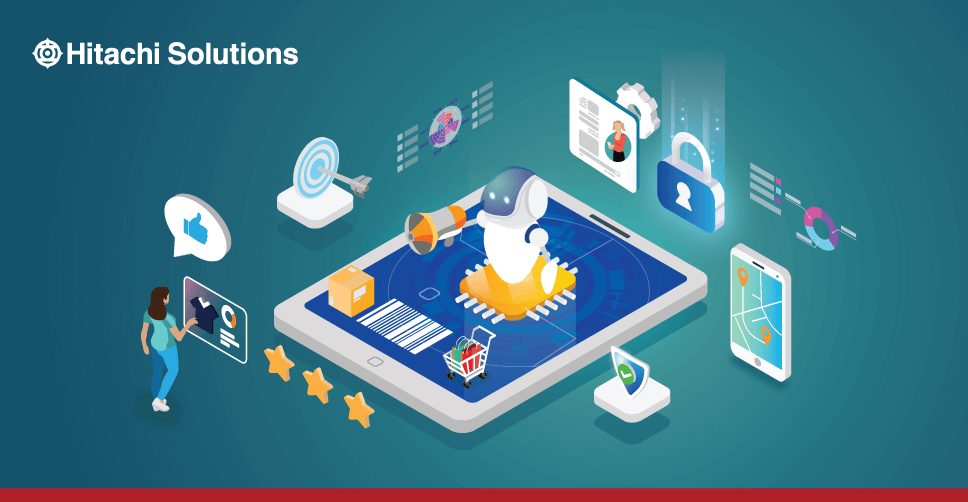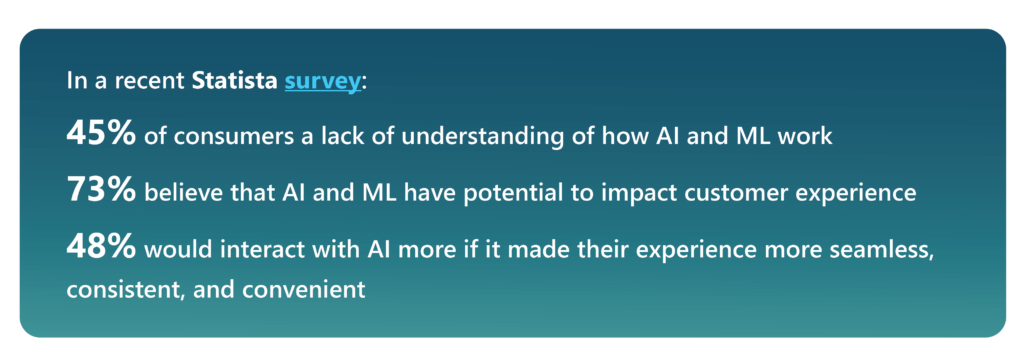

If the last six months have demonstrated anything, it’s that AI is moving full speed ahead. And marketing departments stand to benefit exponentially, as AI surfaces a new world of detailed data analysis and insights that can be used to personalize marketing outreach in expanded and hyper-individualized ways.
It can be a two-sided coin: to get that level of detailed insight for hyper-personalization, marketers need access to customer data— specifically, first-party data, or the data a customer agrees to share. And with that access comes the responsibility to ethically balance the use of that data and customers’ privacy. It’s a level of accountability that is only going to get more attention in the future.
In fact, by 2025, 70 percent of enterprise CMOs will identify accountability for ethical AI in marketing among their top concerns, Gartner said in a recent press release.
Recently, Hitachi Solutions experts discussed managing the fine line of AI-infused marketing in an Exchanges Podcast, Build Customer Experiences with Unified Data Platforms. Listen to the podcast if you like, or read on for the takeaways.
____________________________________________________________________________________
“The good news is what I’m seeing and hearing a lot from organizational leaders is an interest in leveraging this technology (AI) responsibly and ethically,”
Dave Horstein, Hitachi Solutions’ Advisory Client Partner Services
____________________________________________________________________________________
What’s all the buzz about?
When an organization has a significant amount of exclusive first-party data, it can be a significant competitive edge in the development of AI platforms, because having unique and proprietary data gives organizations the power to create AI models tailored to their specific needs, goals, and challenges. Ultimately, the models help generate insights that can optimize processes, make better decisions, and enhance their market position in more effective— and cost effective— ways.
With AI’s ability to analyze, predict and inform patterns in buyer behavior, preferences, demographics and purchase history, the possibilities for hyper-personalized customer experiences that include customized product recommendations, promotions, and content become supercharged. Sentiment analysis, through the addition of third-party data, can add another dimension, allowing marketers to better understand customer emotions and tailor their outreach accordingly.
While this wealth of possibility is welcome, it goes hand in hand with the need for all organizations to understand how and what they are doing with the technology, so that it can be used effectively and responsibly.
With power comes responsibility
When customers agree to provide personal information online, they know their data is being mined and they can be left feeling exposed. In general, however, consumers have shown a willingness (even eagerness) to share some personal data and privacy in exchange for the value that personalized connections can provide.

It’s clear that with the power of all this data, new forms of trust, risk and security management will be necessary to allow this degree of personalization without invasion of privacy. If interactions are perceived as unethical or negative by customers, organizations risk losing hard-earned trust.
Best practices for achieving balance
Some marketers are already using AI to achieve outcomes in personalization, revenue acceleration, and analytics. If an organization is using AI in its marketing efforts today, it should already be:
- Explaining to customers what data is being collected and how that data will be used
- Offering opportunities for individuals to opt out of data capture and use products or services anonymously
- Regularly reviewing the methods of data capture that are used and how details about it are communicated to customers
By communicating with customers transparently now, organizations will be much better positioned to respond to new AI-related privacy policies and regulations as they become mainstream.
____________________________________________________________________________________
“It’s a balancing act, and one that we need to approach with care and responsibility.”
– Brittany LeMaro, Hitachi Solutions Director of Marketing Capability
____________________________________________________________________________________
The key is in understanding and being able to explain how you segment customers, drive recommendations, and generate content in order to effectively govern the output of an AI system, said Luke McGrath, Hitachi Solutions’ Chief Technology Officer.
“Compliance of legislation that’s being driven in specific regions, Canada and the EU specifically, and even in the US, Is going to be increasingly important,” said McGrath. “And with that, making sure that we have the right policies and procedures in place to meet privacy and compliance regulations, along with the necessary governance and approvals processes internally.”
Keeping the big picture in mind
We’re sitting at an inflection point in the advancement of AI, where the gaps between the organizations that are using AI and those that aren’t is going to be compounded exponentially over the coming years.
Understanding the state of your data, along with a strategy for how you want to use it is really the first step to AI enablement of any process. So, when the two, AI and data, are working effectively together, it creates a positive feedback loop: better data means better models, better models mean more efficient processes, and more efficient processes mean that we can drive more accurate data collection as a result.
___________________________________________________________________________________
“It’s encouraging to see Microsoft and other organizations are trying to get ahead of that and collaborate with governments and get some standards out there that we can all adhere to.”
– Dave Horstein, Hitachi Solutions Advisory Client Partner Services
_____________________________________________________________________________________
The future of AI-driven marketing and privacy
With AI moving full-speed ahead, the impact of potential privacy regulations on AI-driven marketing remains to be seen. It is likely that there will be a greater emphasis on user consent, transparency, and accountability, which could change the way marketers leverage AI technologies for advertising and customer engagement.
There is still more to research and more to learn that will undoubtedly lead to new policies and engineering practices that advance the trustworthiness of organizations’ AI engagements. And most importantly, it’s a matter of humans staying fully in control and confident in and accountable for AI systems.
And, in the process of making marketing more intelligent, AI has the potential positive side effect of making brands more human by enabling marketers to spend more time and energy on listening, relationship building, creativity, and community. “It gives companies the opportunity to focus on bigger picture strategic initiatives that can really improve customer experiences overall,” added LeMaro.
Find the right partner
There is no “one” right approach, so working with experts at Hitachi Solutions is the best next step. With our combination of AI experience, industry expertise, and depth of technical knowledge across all the Microsoft products and platforms we are uniquely positioned to take advantage of the advancements and investments that Microsoft is making in the AI space, and help you do so responsibly and ethically.
To learn more about how Hitachi is approaching the world of AI with its customers and partners, watch our practical, nuts-and-bolts webinar: Innovate with AI and Cloud Scale Databases in Every App. Or, if you’re ready to start investigating how responsible AI can accelerate your marketing efforts, reach out to us. We’d love to talk!


